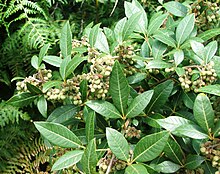Searsia tomentosa
Appearance
| Searsia tomentosa | |
|---|---|

| |
| Scientific classification | |
| Kingdom: | Plantae |
| Clade: | Tracheophytes |
| Clade: | Angiosperms |
| Clade: | Eudicots |
| Clade: | Rosids |
| Order: | Sapindales |
| Family: | Anacardiaceae |
| Genus: | Searsia |
| Species: | S. tomentosa
|
| Binomial name | |
| Searsia tomentosa (L.) F.A.Barkley (1943)
| |
| Synonyms[1] | |
| |
Searsia tomentosa, the real wild currant (English), umhlakoti (Zulu) or korentebos (Afrikaans), is a small, bushy, evergreen tree. It is native to South Africa, Lesotho, and Zimbabwe.[1] It occurs in fynbos and coastal shrub in South Africa, where it is naturally most common in forest margins.
The sprays of small greenish flowers emit an unpleasant smell that attracts flies. However it is also an attractive shrub and is grown internationally in botanical gardens for its multi-coloured foliage.
References
[edit]- ^ a b Searsia tomentosa (L.) F.A.Barkley. Plants of the World Online. Retrieved 25 September 2023.
- Van Wyk, Braam; Van Wyk, Piet (1997). Field Guide to Trees of Southern Africa. Struik. ISBN 978-1-86825-922-9.
